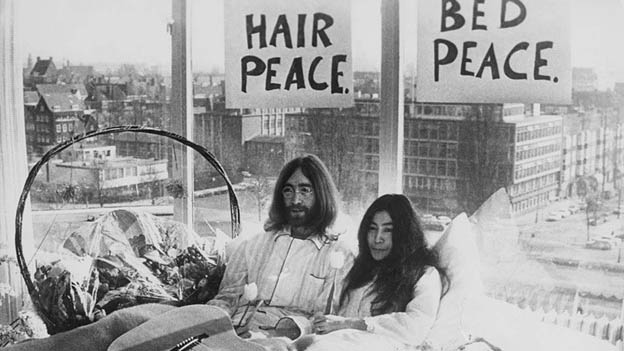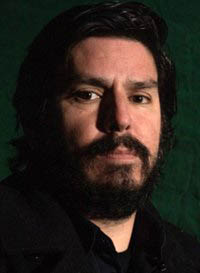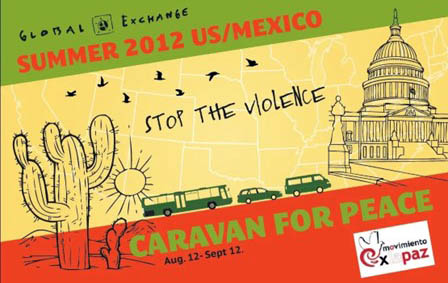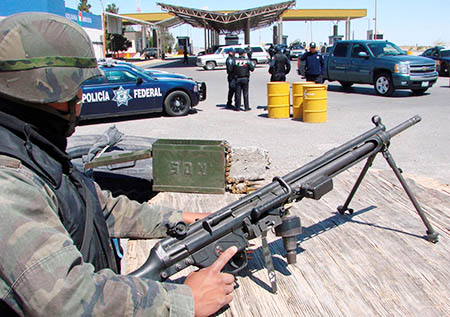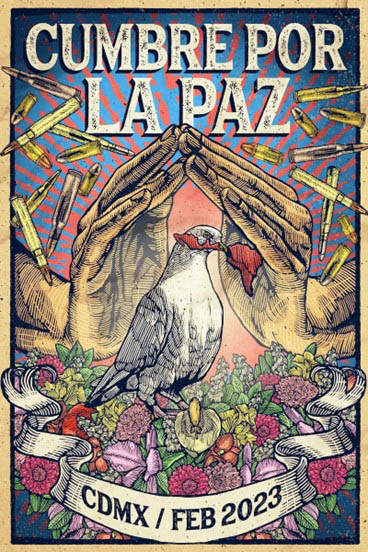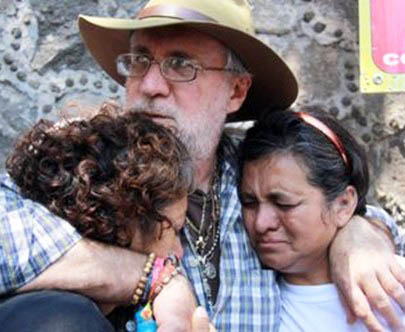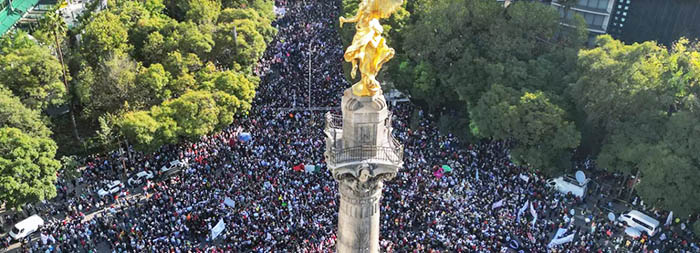|
|
|
|
The weekly newsletter of the México Solidarity Project |
|
|
|
Online at mexicosolidarityproject.org |
|
November 30, 2022/ This week's issue/ Meizhu Lui, for the editorial team |
|
|
Photo: Keystone/Hulton Archive/Getty Images |
|
Giving Peace an Across-the-Border Chance |
|
“Peace is not something you wish for,” John Lennon asked us to recognize over a half-century ago. “It's something you make, something you do, something you are, and something you give away."
John Lennon and Yoko Ono staged a “Bed-In” to dramatize their anti-war stance all those years ago, and Lennon’s definition of peace remains as cogent as ever. But John himself died in senseless gun violence.
That senseless violence continues, and after our most recent eruption of gun deaths in mundane settings — places considered safe by those who frequented them — we once again feel with all our hearts the disconnect between the peace we desire and the violence we live with.
In the United States, the media regularly paint México as a violent and dangerous place. México sees the US the same way. Both are seeing each other correctly. And both are facing the same instruments of violence: guns from the USA.
Other sources of violence also don’t respect borders: migration, climate change, misogyny. Our countries remain inextricably connected, as Marco Castillo, the organizer of the upcoming binational US/México Summit for Peace, reminds us in this week’s issue.
Both countries can also point to gains by strong social movements. In México, women have ended the persecution of women who need abortions, and rank-and-file labor activists have replaced thuggery with democracy. In the United States, local Black Lives Matter organizers have added service-oriented personnel to help those who step outside the law, and electoral activists have held the line against the threats of election-deniers.
We have much to learn from each other. And we have issues we can only resolve by working together. Yes, John, we must “give peace a chance.”
We encourage all our readers to join Marco and Global Exchange as they endeavor to bring individuals and organizations from the US and México into ever closer contact, as they work to replace warmongering with peacemaking. We have no alternative. |
|
|
|
Don’t miss an issue. Subscribe to the weekly México Solidarity Bulletin! |
|
|
|
|
Peace: The Pathway Connecting the US and México |
|
Marco Castillo, an anthropologist and activist from Puebla, has spent 20 years promoting transnational projects and regional social justice movements. Currently the co-director of Global Exchange and an advisor to the Network of Transnational Peoples, he lives, works, and dreams between Puebla and New York. Castillo has lately been devoting a major share of his time to organizing this February’s upcoming US/México Peace Summit — Cumbre de la Paz — in México City.
What experiences have made you so passionate about ending violence? |
|
|
I was raised between two worlds: my father indigenous, my mother white mestiza. From an early age, I witnessed violence, men against women, mestizo against indigenous, white against people of color.
In 1995, my world changed, with the Zapatistas my wake-up call. The Zapatistas took up a courageous attack against neoliberalism, a regime that they believed would increase violence against the common people. After college, I went to Tlaxcala state, where NAFTA had forced so many people to leave home, just as the Zapatistas predicted. For those left behind, those who left seemed to have fallen into a hole and could no longer be touched.
After a few years doing community service in these communities, I learned that the people in Tlaxcala didn’t need outsiders like me to “help” them. Local leaders felt I could be more effective going to the United States and, among other things, find those who had dropped out of sight and help reconnect them with their families. That’s how I began doing transnational organizing.
Armed conflicts, repression, and violence against women and minority peoples are going on around the world. Why the focus on a México/US Peace Summit? |
|
All over the world, US guns are contributing to violence. Those of us in the US must stop the traffic. The México/US corridor has become a global epicenter of US arms trafficking.
Millions have died since the war on drugs began in 1971, first in the US and then adopted in Mexico in 2006 by then President Calderon. |
|
|
The US sent massive numbers of guns to the Mexican military and police to conduct this “war,” and many of those weapons made their way to the very drug dealers the policy was meant to “defeat.” In México, 70 percent of the firearms recovered from crime scenes came from the USA. And the United States itself is suffering from an epidemic of shootings.
What do you hope the Peace Summit will accomplish? What do you mean by “peace”? |
|
We need to see peace as not just the absence of war. Peace requires ongoing work. It’s not an end goal, it’s a path. The Summit will be a place to begin reflecting, organizing, and acting to create a region without guns, where human mobility has become a right, environmental justice a priority. A region where human rights take center stage and marginalized communities can decide their own destinies. These issues exist on both sides of the border. |
|
|
Photo: PBS NewsHour |
|
We also need to see the Peace Summit itself as path, a process, not a one-off event. We’ve had several preparatory forums in the US and México, where people have been listening, talking, learning from each other and those who bear the emotional scars.
In the US, we’ve heard from Black Lives Matter activists and from the parents of those killed in school shootings. In México, we’ve involved parents of the disappeared and migrants who’ve experienced terror along their journeys. Through these conversations, we’re constructing an agenda for peace.
At the Summit we’ll be tackling ways to build an effective movement for peace. What elements make up binational action? What actions can strengthen our work if we do them binationally?
After the Summit — just a stop along the way for us — we’ll hold dialogues with government officials, starting at local levels, to implement changes. We agree with the Zapatista slogan, “think globally, act locally.” Small collaborations can change local realities. Autonomous local initiatives, as they grow in number, can impact whole countries. |
|
You’re casting a wide net in terms of the political orientation of the people you want to attend. Are there peacemaking methods you use in the context of gatherings like this one?
We consider the Summit a gathering of those who feel the urgent need to end violence, not a gathering of the left or the right.
In both the US and México, fear and insecurity are rising. None of us feel safe in our own homes and neighborhoods, no matter what our political beliefs may be.
Within our own spaces like the Summit, we need to create the conditions for dialogue, because we know that without dialogue, only the police will be winners. We also need to understand cultural differences and find a way to surface and accommodate them. |
|
|
Organizing strategies and traditions differ in the United States and México. US organizing puts a lot of energy into advocacy and legislative changes, while most progressive movements for social justice in Latin America are demanding systemic change.
We need to model a kind of leadership that concentrates on asking the right questions, inviting creativity, and giving everyone the same level of power to answer. We don’t believe that a Biden or an AMLO should come up with ideas and impose them on the rest of us. Our definition of leadership skills includes listening, facilitating, and guiding people to put their ideas into action.
In these violent times, you’re boldly demanding peace! What makes you hopeful that peace can be possible?
We can’t put off peace building until we have peace! Global leaders seem to consider peace the last resort to problem solving. But for the people, only making peace can open up the possibility for us to dream again. |
|
|
The Activism — and Silence — of a Father and a Poet |
|
Juan Francisco Sicilia Ortega, a 24-year-old student when he was murdered in 2011, counts as just one of the many innocent victims of the War on Drugs. His father Javier Sicilia, one of México’s most famous poets, became a highly visible activist after his son’s death. He demanded that the government end its militaristic approach to the drug problem and instead start fighting corruption and the impunity from prosecution that those profiting from the drug trade continue to enjoy. Sicilia has now stopped writing poetry. Silence, he contends, can sometimes prove stronger than mere words. Below, his final poem. |
|
|
Photo: El Pais |
|
El mundo ya no es mundo de la palabra Nos la ahogaron adentro Como te asfixiaron, como te desgarraron a ti los pulmones Y el dolor no se me aparta, sólo tengo al mundo Por el silencio de los justos Sólo por tu silencio y por silencio, Juanelo.
The world is no longer the world of words they drowned us inside How they suffocated you, how they tore out your lungs And the pain does not leave me, I only have the world For the silence of the just Only for your silence and for silence, Juanelo. |
|
|
|
An estimated 1.2 million marched in México City Sunday in support of Mexican president López Obrador. Rodrigo Oropeza/AFP |
|
Recent news reports and commentaries, from progressive and mainstream media,
Massive Demonstration of Support for López Obrador in México City, Common Dreams. A huge turnout of supporters marched with AMLO Sunday in a massive demonstration celebrating the transformation of México four years into his six-year term.
Néstor Jiménez, Roberto Garduño y César Arellano, La caminata que encabezó López Obrador duró cinco horas, 35 minutos, La Jornada. AMLO le tomó cinco horas con 35 minutos caminar los 3.9 kilómetros que separan el Ángel de la Independencia del Zócalo capitalino. El Paseo de la Reforma y todas las calles aledañas al primer cuadro de la ciudad lucieron repletas.
Colombia: México agrees to join as guarantor of peace talks with ELN, MercoPress. México had accepted Colombian president Gustavo Petro’s invitation to join as guarantor of the peace talks between Colombia and the ELN guerrillas. AMLO and Petro have also pledged to convene an international summit to redesign and rethink drug policy.
María del Pilar Martínez, Sindicalistas en EU dan su apoyo a la Liga Sindical para negociar contrato con VU Manufacturing, El Economista. En Troy Michigan, donde se encuentran instalaciones de la empresa VU Manufacturing, un evento es parte de una colaboración más amplia que hay con el Comité Fronterizo de Obreros y una organización bi-nacional, México Solidarity Project, con La Liga.
Jeff Abbott, The Other Americans: CPAC Comes to Latin America, The Progressive. The US far right’s outreach “South of the Border” took a major step forward in México City earlier this month.
Dulce Olvera, Familias con niños enferman por plaguicidas en el campo, y el Congreso aún “debate”, SinEmbargo. Jornaleros agrícolas, quienes asperjan plaguicidas tóxicos en los cultivos, presentan llagas en los pies, salpullido, malformaciones, conjuntivitis o hasta tumores, malestares que también se han observado en los familiares con los que conviven.
The ambitious proposals of México’s Morena party for water and sanitation, Bnamericas. Hydro-food security, says Morenista Rubén Muñoz Álvarez, has become a major national challenge.
Ulises Rodríguez López, Monreal ofrece al PRI, PAN PRD y MC ser su candidato en 2024, Polemón. Monreal Ávila, quien todavía es coordinador de la bancada de Morena en el Senado, se encuentra en negociaciones con los líderes partidistas de la oposición para ser el candidato de su alianza Va X México en las elecciones presidenciales de 2024.
Biden to visit Mexico in early January, Mexican president says, Reuters. AMLO announced the visit at a news conference as his government seeks to work through a major spat over Mexican energy policy with the United States and Canada.
Juan Carlos Cruz Vargas, El dominio del idioma inglés en México es “muy bajo”, Proceso. México se encuentra en el lugar 88 de 111 países en el dominio del idioma inglés, lo cual es calificado como “muy bajo”, de acuerdo con el EF English Proficiency Index, un ranking mundial que clasifica a los países por su nivel de dominio del idioma inglés como lengua extranjera. |
|
|
The Mexico Solidarity Project brings together activists from various socialist and left organizations and individuals committed to worker and global justice who see the 2018 election of Andrés Manuel López Obrador as president of México as a watershed moment. AMLO and his progressive Morena party aim to end generations of corruption, impoverishment, and subservience to US interests. Our Project supports not just Morena, but all Mexicans struggling for basic rights, and opposes US efforts to undermine organizing and México’s national sovereignty.
Editorial committee: Meizhu Lui, Bruce Hobson, Bill Gallegos, Sam Pizzigati, Courtney Childs, Victoria Hamlin, Agatha Hinman, Steven Hollis. To give feedback or get involved yourself, please email us! |
|
|
|
Web page and application support for the México Solidarity Project from NOVA Web Development, a democratically run, worker-owned and operated cooperative focused on developing free software tools for progressive organizations. |

